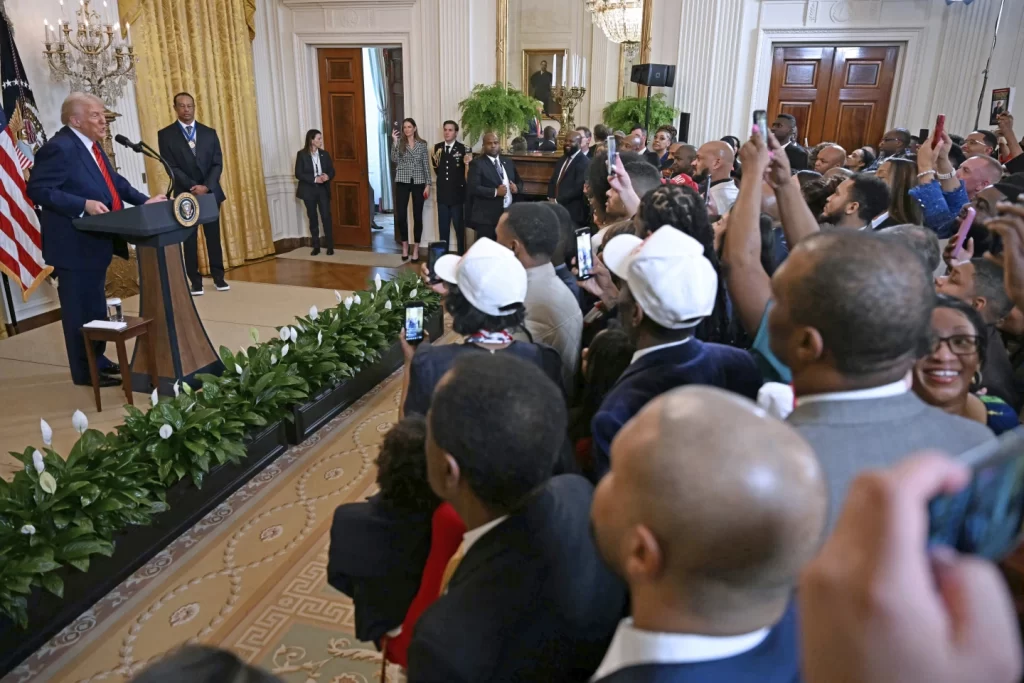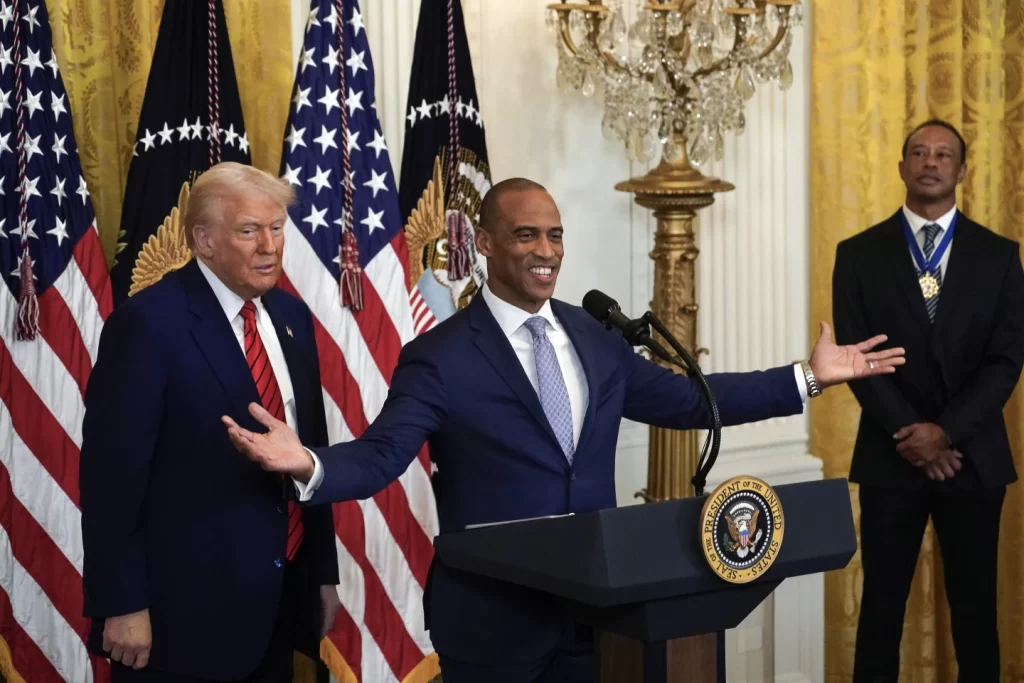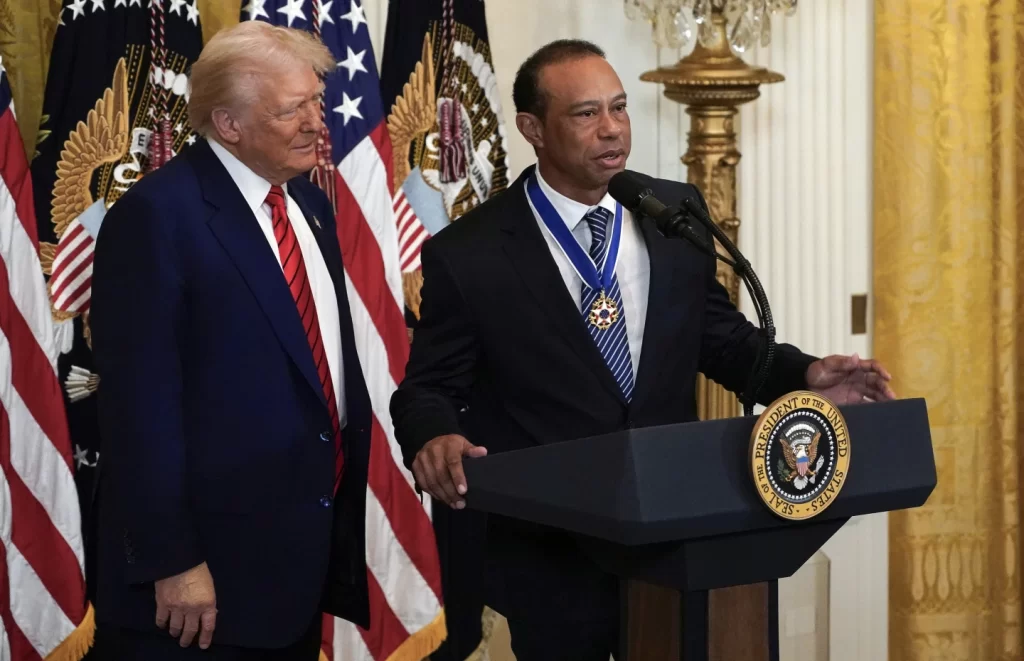By Matt Brown and Michelle L. Price
WASHINGTON (AP) — President Donald Trump marked Black History Month at the White House on Thursday by making an appearance at a celebratory reception with a surprise guest, golf legend Tiger Woods, while calling out other athletes in attendance and marveling at the size of the crowd.
Trump also announced he planned to bring Alice Johnson, a prison reform advocate whom he pardoned in 2020, into his administration to work on clemency issues.
The White House’s Black History Month reception preserved a tradition, but it comes in the wake of Trump issuing a wide-ranging executive order ending the federal government’s diversity, equity and inclusion programs has disrupted its observance elsewhere.
“Today, we pay tribute to the generations of Black legends, champions, warriors and patriots who helped drive our country forward to greatness. And you really are great, great people,” Trump said.

April Ryan of BlackPressUSA.com added that Trump said, “One of the reasons why I am president today is because of the Black vote.” There was a resounding response of “We love you” and “Thank you” from the exuberant crowd.
In November 2024, presidential candidate Donald John Trump won 20 percent of the Black vote. He won 13 percent of the vote in 2020 and 8 percent in 2016, Ryan noted.
Flanked alongside the president was Woods. Sen. Tim Scott of South Carolina, the longest-serving Black US Senator in history was also in attendance. The 47th president also recognized that “we now have more Black Republicans serving in the US House than any time in history.”
Trump didn’t mention his anti-DEI crusade in as he addressed hundreds of guests in a reception in the East Room, though he did make a brief reference of the The New York Times’ “1619 Project,” which highlights the lasting consequences of slavery in America.
Trump objected to the project during his first term, and in response created a commission to promote so-called patriotic education dubbed the 1776 Commission.
“The last administration tried to reduce all of American history to a single year, 1619. But under our administration, we honor the indispensable role black Americans have always played in the immortal cause of another day, 1776,” Trump said. “We like 1776.”
Trump has called DEI programs “discrimination” and pushed to eradicate diversity programs from the government, directed that DEI workers eventually be laid off and exerted similar pressure on the private sector to shift to an exclusive focus on merit.
The sweeping effort has sown discord and confusion across federal agencies, which have variously interpreted the order to limit how they can acknowledge race in history and culture or report demographic data on race and gender.
Shermichael Singleton, a Republican strategist and TV host, attended the standing-room-only event and told BlackPress USA said, “I am glad President Trump acknowledged the incredible contribution of Black Americans, regardless of people’s differences with him. It is important that every president recognizes the contributions of Black Americans since the inception of this country.”
Trump saluted the valiant efforts of a slave named Prince Estabrook who fought alongside minutemen in the Revolutionary War. Estabrook is reported to be the first Black soldier injured in the American Revolution. Upon Estabrooks’ return to Massachusetts after the war, he was a free man.
He commented about the nation’s 250th anniversary where he said I “look forward to honoring the contributions of countless black Americans who fought to win, protect and expand American freedom from the very beginning.”
Invited guests, according to a White House official, also included Republican Rep. John James of Michigan; Alveda King, a niece of civil rights leader Martin Luther King Jr.; and Herschel Walker, the football legend who is Trump’s choice as U.S. ambassador to the Bahamas. Other invited guests included figures from sports and entertainment, including former ESPN host Sage Steele; former NFL player Jack Brewer; and rap stars Kodak Black, Lil Boosie and Rod Wave, according to the official, who was not authorized to speak publicly and spoke on condition of anonymity to the AP.
In support of the Black History Month event, Trump also announced plans for statue gardens in multiple states “of all of our heroes” of people like Jackie Robinson, Frederick Douglass, Aretha Franklin, and Coretta Scott King, Muhammad Ali, Kobe Bryant, and Harriet Tubman, Ryan reported.
Throughout the presidential speech, several guests were spotted standing on White House chairs they used for a lunch of lamb chops and shrimp and grits. At one point a White House official was seen walking through the crowd telling people to get off the chairs. Ryan said she has never seen in 28 years anyone standing on the chairs in the East Room of the White House.

The event had a few sour notes. The head of the pharmaceutical company, Pfizer received an overwhelming round of boos. A woman with her husband and her baby son explained the boos were because “the crowd didn’t like vaccines, mostly the COVID vaccines.”
Before the president entered the room with Woods, spotted in the crowd was a life-size cutout of Black Georgia, Pastor Jamal Bryant bobbing up and down in the crowd occasionally before the president entered the room.
Black Press USA spoke with Dr. Bryant. The New Birth Missionary Baptist Church pastor questioned “How do you get something like that in the White House?” The sign was a life-size replica of his head on a stick that at points was bouncing in the air at the event. The hand sign was believed to be an effort to target and intimidate the Georgia Pastor for his sharp criticism of the Trump administration and his boycott of stores that are dropping DEI.
In the wake of Trump’s executive order, the Defense Department issued guidance declaring “identity months dead” and said that working hours would no longer be used to mark cultural awareness months such as Black History Month, Women’s History Month and National Disability Employment Awareness Month.
That seemed to clash with a National Black History Month proclamation signed the same day by Trump, which called for “public officials, educators, librarians, and all the people of the United States to observe this month with appropriate programs, ceremonies, and activities.”
While the White House has issued its position, agencies of the government have discretion on whether to continue to recognize Black History Month, according to the official.
On Feb. 1, the first day of Black History Month, Transportation Secretary Sean Duffy announced that his department “will no longer participate in celebrations based on immutable traits or any other identity-based observances.” And in a diplomatic cable, Secretary of State Marco Rubio said the agency’s removal of DEI policies would dovetail with “eliminating our focus on political and cultural causes that are divisive at home and deeply unpopular abroad.”
The administration has issued a deadline to schools and universities to eliminate diversity initiatives or risk losing federal money. Major corporations have backtracked on DEI policies in hiring, promotion and workplace culture in recent months, with many citing potential legal challenges from the administration.
Black History Month has been recognized by every U.S. president since 1976, including Trump during his first term.
“Black History is American history. And similar to the story of our nation, it is a story of strength, resilience, and dogged perseverance,” said CJ Pearson, a national co-chair of the Republican National Committee’s youth advisory council. Pearson, who is Black, has been an outspoken defender of Trump against Black civic leaders, civil rights advocates and Democrats who lambast the president as racist.
“President Trump’s anti-DEI policies aren’t promoting racism but what they are doing is manifesting the dream of the great Martin Luther King, Jr.: a nation where one isn’t judged by the color of their skin but instead by the content of their character,” said Pearson, who expected to attend the White House event.

Other Black Republicans aren’t so sanguine about the administration’s current course or what it portends for the GOP’s nascent inroads with Black voters or other communities of color.
“Trump can build upon the coalition he pulled together in November with Blacks and Asians and Hispanics and young folks,” said Raynard Jackson, a Republican strategist. “But if they leave it the way it stands right now, Trump is going to destroy the very coalition he so marvelously brought to the table in November.”
To Jackson, DEI is a catch-all for liberal policies that are “unrecognizable” from the original intent of civil rights laws meant to promote the social and economic progress of Black Americans. But in removing and denigrating the policies, Jackson said, the White House risked being labeled as discriminatory by offering no alternative framework for how disadvantaged communities can get ahead.
“How do you have diversity without it being a mandated bean-counting situation?” Jackson asked. “They’ve done a masterful job at telling me what they’re against. I’m waiting to hear what they’re for.”
During the 2024 campaign, Trump tried to reach Black voters through in-person events in Atlanta, Chicago and New York. His campaign courted Black celebrities and media personalities to boost his message. Trump’s Black conservative allies, including Rep. Byron Donalds, R-Fla., conducted roundtables at Black barbershops and bus tours through majority-Black cities.
But Trump also frequently denigrated Black communities in his pitch and made claims that pitted voters of color against immigrants, who he said were taking “Black jobs” and “Hispanic jobs.”
The efforts to boost support among Black voters seemed to have some success. He won a larger share of Black voters than he did in 2020, particularly among young Black men, according to AP VoteCast, a nationwide survey of more than 120,000 voters in the 2024 election.
___
Price reported from New York.
Ryan is the Washington, D.C. Bureau Chief for BlackPressUSA.com
First published February 21, 2025



